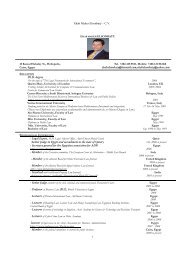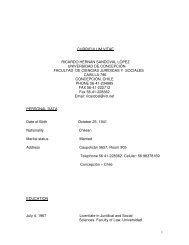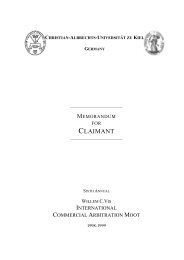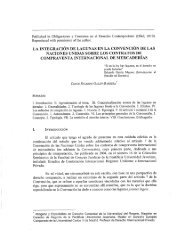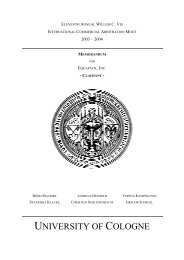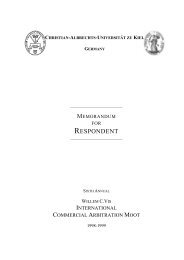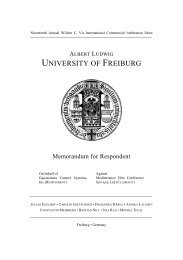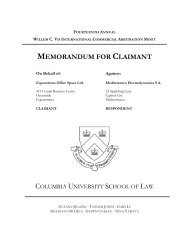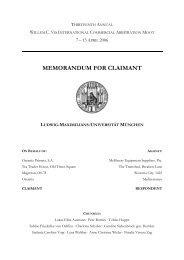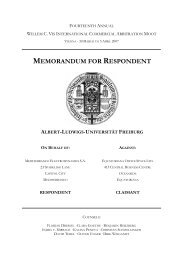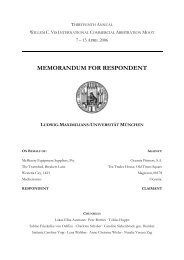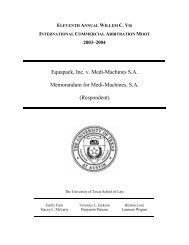MEMORANDUM FOR RESPONDENT - Pace University
MEMORANDUM FOR RESPONDENT - Pace University
MEMORANDUM FOR RESPONDENT - Pace University
Create successful ePaper yourself
Turn your PDF publications into a flip-book with our unique Google optimized e-Paper software.
QUEEN’S UNIVERSITY FACULTY OF LAW<br />
reappointed Mr. Y [Ltr. 13 August 2010]. The Milan Rules do not contemplate the reappointment<br />
of an arbitrator previously denied confirmation. Accordingly, Mr. Y’s reappointment did not give<br />
rise to the Council’s authority to appoint a substitute; Mr. Y was not a replacement arbitrator.<br />
The Council acted outside its authority in appointing Mr. Z.<br />
2. The Council should have invited the party-appointed arbitrators to make<br />
another appointment.<br />
15. The reappointment of Mr. Y did not warrant direct intervention by the Council. Instead, the<br />
Council should have invited the party-appointed arbitrators to make a new appointment. The<br />
Council should respect the Parties’ intentions to have the party-appointed arbitrators appoint the<br />
presiding arbitrator. This would facilitate cooperation between members of the Tribunal [Moses<br />
125]. Furthermore, the appointment procedure chosen by the Parties gives the Parties an indirect<br />
influence on the selection of the presiding arbitrator [Lew et al. 250]. The Parties’ mutual<br />
intentions should not be abrogated merely because the Milan Rules do not address the situation<br />
before the Tribunal. None of the other bases that might justify the intervention of the<br />
administering institution were present here. Neither party was attempting to delay or frustrate<br />
the arbitral proceedings [Luttrell 3; Gaillard/Savage 483, 554; Lew et al. 318]. Instead, the party-<br />
appointed arbitrators were exercising their delegated authority to appoint a presiding arbitrator.<br />
Faced with a situation not contemplated by its Rules, the Council should simply have abided by<br />
the Parties’ Agreement and given the party-appointed arbitrators another opportunity to select a<br />
new presiding arbitrator.<br />
II. <strong>RESPONDENT</strong> DID NOT WAIVE ITS RIGHT TO OBJECT TO THE JURISDICTION OF THE<br />
TRIBUNAL.<br />
16. Claimant may argue that Respondent waived its right to object to the jurisdiction of the Tribunal.<br />
The Tribunal should find that Respondent raised a valid objection; the waiver conditions in the<br />
Parties’ Agreement have not been met. According to the Parties’ Agreement, an objection must<br />
be raised “in the first brief or at the first hearing following the claim to which the objection<br />
relates” [art. 12 2010 Milan Rules] or, under the Model Law, “without undue delay” [art. 4].<br />
Accordingly, to find a valid waiver, a party must know of the non-compliance, proceed to<br />
arbitration and fail to state an objection without undue delay [Binder 55]. These requirements<br />
have not been met. Respondent was unaware of the improper constitution of the Tribunal when<br />
it submitted its Statement of Defence [A]. The time between the improper constitution and<br />
Respondent’s objection does not amount to undue delay [B], and Respondent’s objection is not<br />
disruptive of the proceedings [C]. Respondent acted within its rights to object.<br />
6



